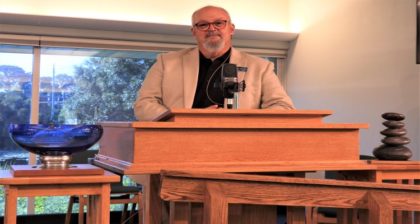 Minister’s Corner
Minister’s Corner
“So provocative!” the woman had said, responding to some of the religious-sounding words she’d heard used at church. Others chimed in: “I’m not comfortable with this kind of language,” and “I’m bothered by these concepts,” and then the sentiment most often repeated, “I just have so many questions.”
Questions are what we’re all about. As the old joke goes, “How do you get Unitarian Universalists out of the neighborhood?” Answer: “You burn a question mark on their lawn.”
While it was no joke back in the 1960’s when there was indeed a cross burned on the lawn of one UU church I’m aware of, that congregation is still thriving in that city, perhaps because the culprits burned the wrong symbol.
We come together from many paths, bringing different understandings, different symbols, and different baggage from the previous stops on our religious and spiritual journeys. One of the things we do together here in our faith community is to sort through those understandings, those symbols, that baggage and see if we can begin to understand and re-imagine difficult concepts, old words, and ancient symbols in new ways. Thus we might begin to jettison the unnecessary baggage that holds us back from becoming who we’re meant to become.
Of course, we sometimes need to have a safe place to come when we’re troubled, a place to find easy friendships with like-minded people – in short, a place to be comforted. But when that’s the only thing this place is for us, we miss at least half of what we’re really here for. Yes, we should offer comfort where it is needed: “visit the sick, clothe the naked, feed the hungry,” it has been said. But we shouldn’t stop there.
If we are called to comfort the afflicted, we are also called to afflict the comfortable – including ourselves. We are called to change things for the better as best we can, whether that means marching on City Hall, picketing the Statehouse, writing our members of Congress, or challenging assumptions right here in our midst.
Change often doesn’t come until the pain of not changing becomes too great. Sometimes we need a little comfort, but sometimes we need a little challenge, too – sometimes we need to be provoked.
 So, “provocative,” she said.
So, “provocative,” she said.
“Yes,” we should respond, “and that’s a good thing.”
See you in church,
![]()
